While many people in the UK prepare for Christmas, a number of our members have been hard at work supporting disaster simulation exercises and delivering mapping training to our partners in different parts of the world.
UNDAC induction course in Ecuador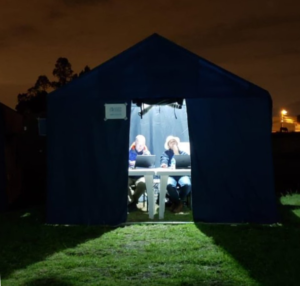
In the first week of December, three MapAction volunteers were in Riobamba supporting an UNDAC (United Nations Disaster Assessment Coordination) disaster simulation exercise with maps and data visualisations.
The team worked hard to produce a large number of maps in a short space of time under realistic field conditions.
Earthquake simulation in Armenia
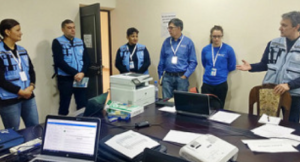 At the same time, two MapAction volunteers travelled to Yerevan, Armenia, to support the International Search and Rescue Advisory Group’s (INSARAG) regional earthquake response exercise with maps. This simulation exercise was particularly poignant, coinciding as it did with the 30th anniversary of the Spitak earthquake, which killed over 25,000 Armenians and injured over 130,000 more.
At the same time, two MapAction volunteers travelled to Yerevan, Armenia, to support the International Search and Rescue Advisory Group’s (INSARAG) regional earthquake response exercise with maps. This simulation exercise was particularly poignant, coinciding as it did with the 30th anniversary of the Spitak earthquake, which killed over 25,000 Armenians and injured over 130,000 more.
During the exercise, the MapAction team worked with an UNDAC team as well as collaborating with various Search & Rescue and Emergency Medical Teams from around the world.
Induction course in Indonesia
Meanwhile, in Bogor, Indonesia, two MapAction volunteers took part in another earthquake simulation exercise as part of the 10th Induction Course of the Association of the Southeast Asian Nations Emergency Response and Assessment Team (ASEAN-ERAT). They mapped the exercise and provided a GIS refresher course.
We’ve worked closely with the ASEAN-ERAT team this year, having supported a number of training activities as well as four emergency responses (two in country and two remotely). It’s great to be strengthening our relationship with each new exercise, ensuring a very effective collaboration when circumstances demand it.
Humanitarian mapping course in Jamaica
Last week, a three-person MapAction team was in Jamaica delivering a humanitarian mapping course to emergency response coordinators from another close partner, CDEMA (the Caribbean Disaster Emergency Management Agency). This is part of a programme of longer term disaster preparedness we are working on with CDEMA supported by EU ECHO (the European Civil Protection & Humanitarian Aid Operations).
National mapping and data management training in Kyrgyzstan
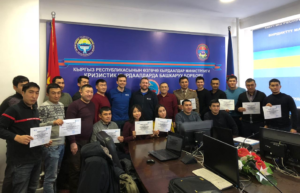 A further two MapAction volunteers were in Bishkek last week to deliver a package of training on mapping, data collection and data management for national disaster management agencies.
A further two MapAction volunteers were in Bishkek last week to deliver a package of training on mapping, data collection and data management for national disaster management agencies.
This is part of our ongoing collaboration with CESDRR (the Central Asian Center for Emergency Situations and Disaster Risk Reduction) which sees us helping to develop best practice for emergency data management across the region.
We’re very grateful to the Office of U.S. Foreign Disaster Assistance (OFDA) for funding our participation in the Ecuador, Armenia, Indonesia and Kyrgyzstan activities and to EU ECHO for the Jamaica course.
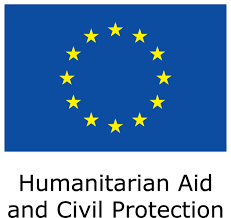
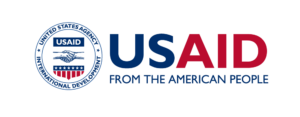

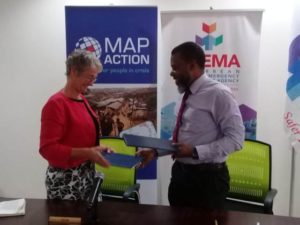 (CDEMA) to help prepare for and respond to disasters and emergencies in the Caribbean region. We collaborated around the responses to
(CDEMA) to help prepare for and respond to disasters and emergencies in the Caribbean region. We collaborated around the responses to 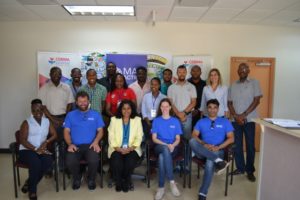 MapAction’s Chief Executive Liz Hughes traveled out to Barbados for the MoU signing ceremony. “Collaboration and partnership are fundamental to MapAction’s approach,” she commented. “We are delighted to have the opportunity to deepen and formalise our working relationship with CDEMA and we are keen to support them and their partners in whatever way we can.”
MapAction’s Chief Executive Liz Hughes traveled out to Barbados for the MoU signing ceremony. “Collaboration and partnership are fundamental to MapAction’s approach,” she commented. “We are delighted to have the opportunity to deepen and formalise our working relationship with CDEMA and we are keen to support them and their partners in whatever way we can.”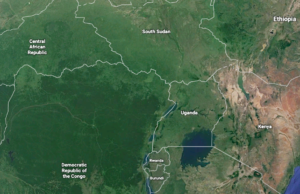
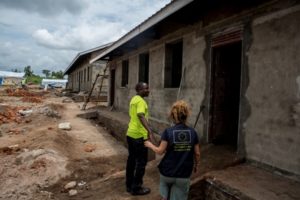
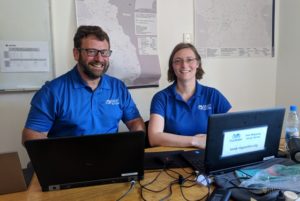 A two-person MapAction team flew to Kampala, Uganda last week to provide mapping and information management support to humanitarian teams responding to a major refugee crisis in the region. This follows a recent upsurge in conflict in the eastern part of the Democratic Republic of Congo (DRC), causing significant displacement of people into Uganda, a country that is already contending with a large influx of refugees from South Sudan. Around 1.9 million people have fled DRC since the start of 2017, with 242,000 being hosted in Uganda. The United Nations Office for the Coordination of Humanitarian Affairs (UN OCHA) estimates that 13.1 million people are in humanitarian need within DRC.
A two-person MapAction team flew to Kampala, Uganda last week to provide mapping and information management support to humanitarian teams responding to a major refugee crisis in the region. This follows a recent upsurge in conflict in the eastern part of the Democratic Republic of Congo (DRC), causing significant displacement of people into Uganda, a country that is already contending with a large influx of refugees from South Sudan. Around 1.9 million people have fled DRC since the start of 2017, with 242,000 being hosted in Uganda. The United Nations Office for the Coordination of Humanitarian Affairs (UN OCHA) estimates that 13.1 million people are in humanitarian need within DRC.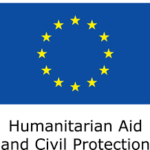 This latest MapAction deployment follows an earlier scoping mission undertaken by a two-person MapAction team during April this year to assess needs and how MapAction can help. MapAction offered support to in-country teams with analysing and reporting of gathered information to understand the needs of displaced communities. MapAction’s work is being funded by a two-year grant from European Civil Protection and Humanitarian Aid Operations (EU ECHO) aimed at strengthening effective, evidence based humanitarian decision-making. We will continue to provide support both in-country and remotely for around two months.
This latest MapAction deployment follows an earlier scoping mission undertaken by a two-person MapAction team during April this year to assess needs and how MapAction can help. MapAction offered support to in-country teams with analysing and reporting of gathered information to understand the needs of displaced communities. MapAction’s work is being funded by a two-year grant from European Civil Protection and Humanitarian Aid Operations (EU ECHO) aimed at strengthening effective, evidence based humanitarian decision-making. We will continue to provide support both in-country and remotely for around two months.